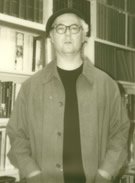Ray Smith Symposium continues 'Sex and Power' theme with visit by Medieval historian
University of Alberta's John Kitchen addresses history of Queer sexuality

The Ray Smith Symposium in Syracuse University’s College of Arts and Sciences continues its yearlong examination of “Sex and Power from the Middle Ages to the Enlightenment” with a mini-residency by renowned hagiographer John Kitchen. Associate professor of history and classics at the University of Alberta, Kitchen will present a keynote lecture titled “Saints and Their Secrets” on Thursday, Jan. 19, at 7 p.m. in the Heroy Geology Laboratory. The following day, he will participate in a Ray Smith-HC Mini-Seminar from 9:30-11:30 a.m. in The SU Humanities Center Seminar Room.
Both events are free and open to the public, however, the seminar requires registration. For more information about the keynote lecture, contact Cassidy Perrault in the college’s Office of Curriculum, Instruction and Programs at 315-443-1414. For more information about the seminar, contact Karen Ortega in the SU Humanities Center at 315-443-5708.
“We are pleased to bring John Kitchen to campus. He is widely revered for his study of the gendered approach to hagiographic literature of the early Middle Ages,” says Dympna Callaghan, symposium co-organizer and SU’s William Safire Professor of Modern Letters.
Kitchen’s research interests span hagiography, the cult of the saints and medieval intellectual history, in addition to methods and theories about the study of medieval Christianity. His book “Saints' Lives and the Rhetoric of Gender: Male and Female in Merovingian Hagiography” (Oxford University Press, 1998) examines the lives of male and female saints—by authors of both sexes—from sixth-century France. By questioning the assumption that male authors were ignorant of or hostile toward certain female concerns, Kitchen forces the reader to reconsider roles that gender played in hagiographic literature of that period.
This year’s Ray Smith Symposium is organized and presented by the Renaissance and Medieval Studies Working Group, composed of interdisciplinary scholars from across campus. Callaghan has taken a leadership role in the planning.
“We are calling into question modern conceptions of gender by historicizing sexual roles and practices in Europe from the fifth to 18th centuries,” she says. “Already, the effects of ‘Sex and Power’ have reverberated throughout the academy, giving rise to interdisciplinary conversations about queer-related curriculum, pedagogy and research.”
“Sex and Power” is enabled by a bequest from the estate of Ray W. Smith ’21. Additional support for this year’s programming comes from the Office of the Chancellor; the departments of art and music histories; English; history; languages, literatures and linguistics; women’s and gender studies; the LGBT Studies Program; and the SU Humanities Center, which sponsors the mini-seminars.
Also, “Sex and Power” is co-sponsoring with Syracuse University Library the exhibition “The Power and the Piety: The World of Medieval and Renaissance Europe,” running Jan. 26-June 22 on the sixth-floor gallery of Bird Library. The exhibition showcases beautiful materials from this period held by the Special Collections Research Center, including illuminated manuscripts, a page from a Gutenberg Bible and Shakespeare’s third folio. For more information, contact Sean Quimby, librarian and director of the SCRC, at 315-443-9759.
The Ray Smith Symposium is named for the Auburn, N.Y., native who, after graduating from SU in 1921, was a highly respected teacher and administrator.
Both events are free and open to the public, however, the seminar requires registration. For more information about the keynote lecture, contact Cassidy Perrault in the college’s Office of Curriculum, Instruction and Programs at 315-443-1414. For more information about the seminar, contact Karen Ortega in the SU Humanities Center at 315-443-5708.
“We are pleased to bring John Kitchen to campus. He is widely revered for his study of the gendered approach to hagiographic literature of the early Middle Ages,” says Dympna Callaghan, symposium co-organizer and SU’s William Safire Professor of Modern Letters.
Kitchen’s research interests span hagiography, the cult of the saints and medieval intellectual history, in addition to methods and theories about the study of medieval Christianity. His book “Saints' Lives and the Rhetoric of Gender: Male and Female in Merovingian Hagiography” (Oxford University Press, 1998) examines the lives of male and female saints—by authors of both sexes—from sixth-century France. By questioning the assumption that male authors were ignorant of or hostile toward certain female concerns, Kitchen forces the reader to reconsider roles that gender played in hagiographic literature of that period.
This year’s Ray Smith Symposium is organized and presented by the Renaissance and Medieval Studies Working Group, composed of interdisciplinary scholars from across campus. Callaghan has taken a leadership role in the planning.
“We are calling into question modern conceptions of gender by historicizing sexual roles and practices in Europe from the fifth to 18th centuries,” she says. “Already, the effects of ‘Sex and Power’ have reverberated throughout the academy, giving rise to interdisciplinary conversations about queer-related curriculum, pedagogy and research.”
“Sex and Power” is enabled by a bequest from the estate of Ray W. Smith ’21. Additional support for this year’s programming comes from the Office of the Chancellor; the departments of art and music histories; English; history; languages, literatures and linguistics; women’s and gender studies; the LGBT Studies Program; and the SU Humanities Center, which sponsors the mini-seminars.
Also, “Sex and Power” is co-sponsoring with Syracuse University Library the exhibition “The Power and the Piety: The World of Medieval and Renaissance Europe,” running Jan. 26-June 22 on the sixth-floor gallery of Bird Library. The exhibition showcases beautiful materials from this period held by the Special Collections Research Center, including illuminated manuscripts, a page from a Gutenberg Bible and Shakespeare’s third folio. For more information, contact Sean Quimby, librarian and director of the SCRC, at 315-443-9759.
The Ray Smith Symposium is named for the Auburn, N.Y., native who, after graduating from SU in 1921, was a highly respected teacher and administrator.
Media Contact
Rob Enslin
